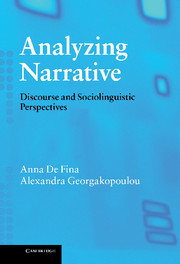Book contents
- Frontmatter
- Contents
- Acknowledgments
- Preface
- Note on transcription conventions
- 1 Narrative definitions, issues and approaches
- 2 Narrative as text and structure
- 3 Narrative and sociocultural variability
- 4 Narrative as interaction
- 5 Narrative power, authority and ownership
- 6 Narrative and identities
- Notes
- References
- Index
5 - Narrative power, authority and ownership
Published online by Cambridge University Press: 05 June 2012
- Frontmatter
- Contents
- Acknowledgments
- Preface
- Note on transcription conventions
- 1 Narrative definitions, issues and approaches
- 2 Narrative as text and structure
- 3 Narrative and sociocultural variability
- 4 Narrative as interaction
- 5 Narrative power, authority and ownership
- 6 Narrative and identities
- Notes
- References
- Index
Summary
Introduction
Storytelling, particularly the kind that occurs in everyday, informal contexts, is often associated with cooperation, shared enjoyment and opportunities for the teller’s display of verbal artistry. Equally important, however, is the association of stories with conflict, for example in relation to who has the right to recount a narrative, who tells the truth and who lies, and what consequences the telling of particular stories may have on the life of individuals and groups. In this respect, when we look at the use of narratives in many concrete domains of social life, we come across questions of power, credibility and authority. Indeed, narrative tellings may serve as occasions for the exercise of power and domination and for the perpetration or creation of social inequalities. It is to these aspects of the intersection between narratives and social life that we turn in this chapter.
Power is an all-encompassing concept, but in the discussion to follow, we tease specific aspects and applications of it to the study of storytelling. Thus, we illustrate how it interrelates with other pivotal concepts that have been used in narrative research within this area, namely: control over linguistic resources, authority, telling rights, truth, ideology and ownership. As we will discuss, power in storytelling often depends on the ability of some and the inability of others to control both the linguistic resources needed to construct narratives and the interactional mechanisms that underlie specific social encounters. Individuals and institutions that are in positions of power also need to legitimize their narratives by showing that they have the right to tell stories and that their narratives are credible depictions of events, agents, motives and circumstances. The first part of the chapter (sections 5.1, 5.2, 5.3) is devoted to the analysis of the linguistic and interactional mechanisms through which power, authority and credibility are concretely established and negotiated within storytelling practices, and to how storytelling may shape and reflect ideologically biased versions of reality. We will also consider how stories are used to provide authority and credibility to groups and individuals and/or to disseminate versions of social phenomena and events. We will therefore discuss studies of narratives in the media and in the political arena. In the second part of the chapter (section 5.4), we will focus on story ownership seen not only as a significant tool for the exercise of narrative power in the social world, but also as a crucial concept in narrative research. This will lead us into an analysis of how this largely romanticized idea of sole ownership has been gradually problematized in favor of the scrutiny of researcher–researched co-ownership.
- Type
- Chapter
- Information
- Analyzing NarrativeDiscourse and Sociolinguistic Perspectives, pp. 125 - 154Publisher: Cambridge University PressPrint publication year: 2011
- 1
- Cited by

